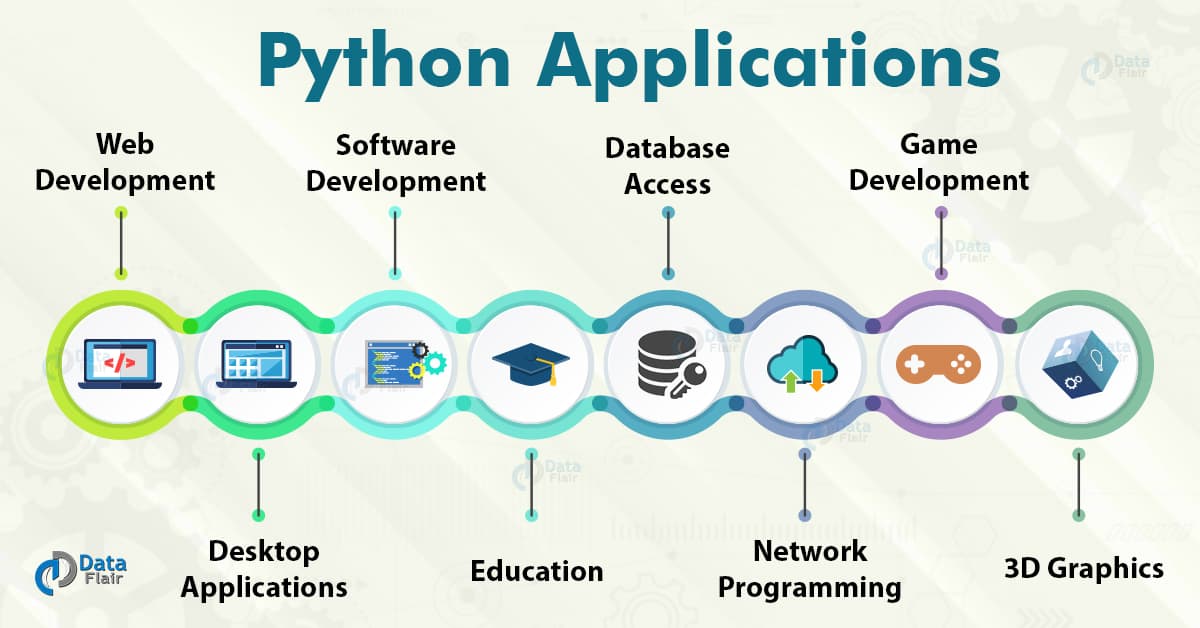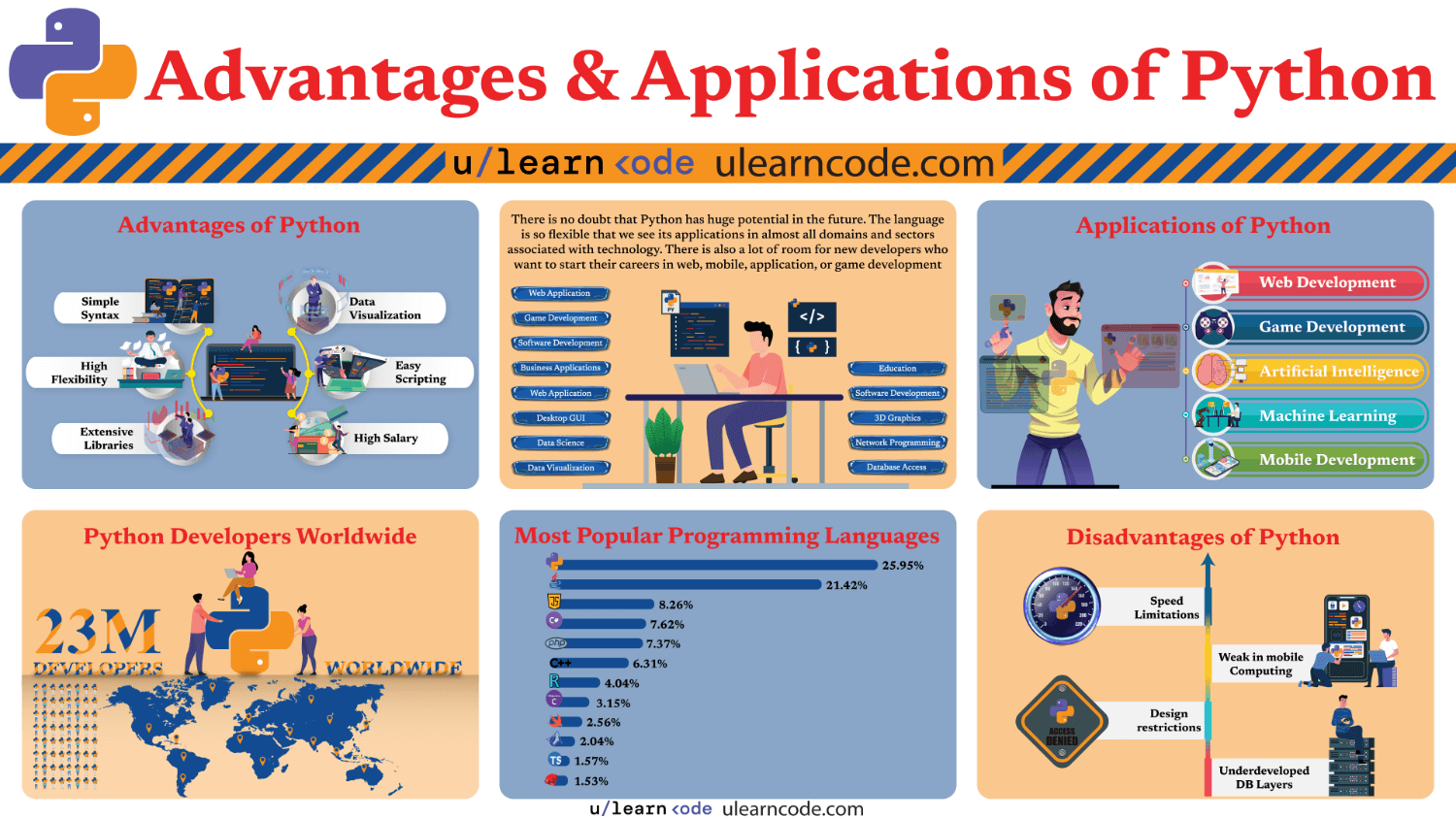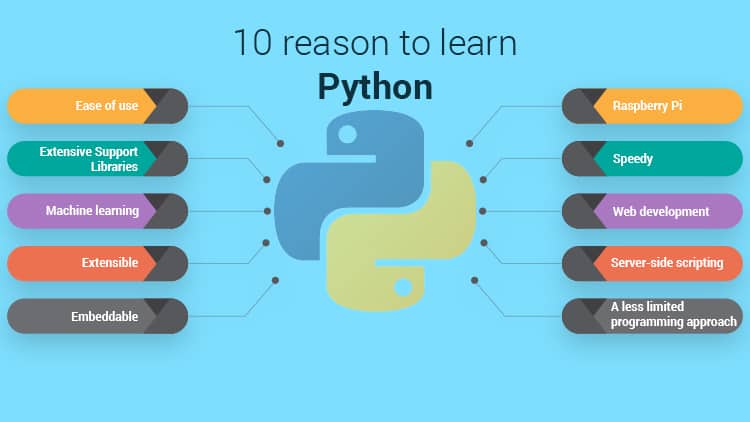Contents
Python is the most versatile general-purpose programming language used in the data science domain and coding. It has a range of frameworks, libraries, and data structures to develop various types of applications, systems, and games for multiple platforms.
This language is a good choice for new developers because of its simple syntax. It has numerous applications, and software development, web browsers, operating system shells, and game development are the most popular ones. In a broad scenario, the language is used for:
- Web Applications
- Game Development
- Software Development
- Business Applications
- Desktop GUI
- Data Science & Visualization

What Is Python Programming Used for?
These are some of the major areas where Python is widely used for programming applications, systems, games, etc.
1. Web Development
This is a flexible language with numerous frameworks and libraries dedicated to web development. Its libraries also facilitate internet protocols such as HTML and XML, JSON, email processing, FTP, and IMAP.
Several Python frameworks are used for web development purposes. These frameworks include:
- Django
- Pyramid
- Flask
- Bottle
It also supports some advanced Content Management Systems (CMS) such as Django CMS and Plone. All these frameworks simplify tasks such as interference with protocols, database interaction, and content management.
Python is known for its simplicity, scalability, and security. So, if you are keen to learn this language and pursue your web development career then choose one of the best web development courses for complete guidance.
If you are still not sure about Python, then check other languages for web development such as Java, JavaScript, PHP and Go, etc. These languages are also popular for web and backend development.
2. Game Development
Game development is certainly not the main purpose of this language but various libraries allow you to create interactive games. Python is used as a foundation in many popular games such as:
- Battlefield
- World of Tanks
- Frets on Fire Vega Strike
- Civilization-IV
There are three or four popular libraries and frameworks that help programmers to develop games in Python. These libraries and frameworks include:
- PySoy
- PyGame
- PyKara
If you want to develop simple games and rapid prototypes for learning purposes, then consider learning this language. Unfortunately, Python is not specifically made to program high-end games. If you are eager to learn more then check out these best game development courses.
There are some other languages for game development that are being used to create high-end games for multiple platforms. These languages include Java, C++, and C# (Unity). So, if you want to pursue your career as a game developer, you should move to these languages instead of relying on Python.

3-4. Artificial Intelligence and Machine Learning
Python is currently a dominant language used to develop AI-based applications. The only reason that it is widely used for AI and Machine Learning is because of its extensive libraries.
The language allows you to develop new algorithms that are able to learn on their own. Such algorithms need to process huge amounts of data in real-time and some libraries fulfill all these requirements.
Some of the most common and useful Python libraries for Artificial Intelligence and Machine Learning are listed below:
- Tensorflow
- Scikit-learn
- NLTK
- Caffee
- PyTorch
- Keras
Artificial Intelligence and Machine Learning work hand in hand to develop extraordinary algorithms for machines that focus on self-learning. There are numerous best AI courses available that teach you to develop self-reliant applications using Python.
Python leads the AI market with 57% of votes among developers when compared with C++. If you are not comfortable with Python development in this domain, then you can consider other languages for AI such as C++, Java, and LISP, etc.
5. Mobile Development
Python covers almost all aspects of application development. The language is known for its flexibility, readability, and ease of use, but it still cannot directly develop and run native Android or iOS applications.
There are a number of Python frameworks that bridge the gap and allows developers to develop native applications. Cross-platform development is also made possible by using frameworks like Kivy and Beeware to facilitate mobile application development for multiple platforms.
Some of the other popular mobile development frameworks include:
- Django
- Numpy
- Flash
- TurboGears
- Web2py
- Matplotlib
If you want to pursue your career as a mobile application developer then you should check the best mobile development courses to get an idea of how things work.
Moreover, Python is not the only language for native app development. There are some other mobile development languages such as JavaScript, Kotlin, C++, and C# that help you create more responsive and functional mobile apps.
Why Should I Learn Python?

There are so many reasons to learn this language over others and we should rather ask ourselves, why not learn Python? The language has so many advantages and here are some reasons for you to learn it:
1. Simple Syntax
Python is one of the easiest languages to learn in terms of its Syntax. The code readability is excellent and any beginner who knows the basics of the language can easily understand it.
Comparatively, it has a much shorter learning curve than other popular languages such as Java, C, and C++.
The simplicity of this language is one of the major reasons that it is widely being used in different domains such as Data Science, Artificial Intelligence, Web Development, Mobile Development, etc.
2. High Flexibility
Python is a highly flexible and scalable language. It allows cross-language operations which means that you can use it along with other high-level languages such as Java and .NET to increase the usability of your programs.
The flexibility is not limited to Java and .NET components, and you can also work with C and C++ libraries.
3. Extensive Libraries
No matter if you want to pursue your career as a web, game, mobile, or software developer, Python has always got your back. So how does this language dominate in so many domains and applications? The answer is its flexible libraries and frameworks.
Python has specific libraries and frameworks to serve different purposes. For example, the PySoy library is particularly used for game development while Djano, Numpy, and Flash facilitate mobile development.
4. Data Visualization
Python always has something to offer in almost every domain and the same is true with data visualization. There is a range of data visualization tools in Python such as:
- Matplotlib
- Plotly
- Altair
- Geoplotlib
- Gleam
- Missingno
The complex datasets can easily be resolved in these specific frameworks and the final findings from the data visualization process can be displayed using graphs, pie charts, and graphical plots, etc.
5. Easy Scripting
What if you want to automate some tasks or develop simple programs? Scripting is your go-to option and this is certainly one of the best scripting languages. Scripts are directly executed once you write the code and it exempts the compilation part.
Your scripts are checked for possible errors during the execution time and if the script is error-free, it can be executed as many times as you need.
6. High Salary
This language has a lot of earning potential even for new developers with little experience. The growth opportunities are endless because of its diversified applications. You can choose your desired Python domain to gain expertise and find a high paying job.
According to a recent Daxx’s research, Python engineers, programmers, and developers are some of the highest-paid individuals in the US. A Python developer on a yearly average earns $110,021 in the US. The salaries for the same developer range from $122,135, and $121,443 in big cities like New York.
Python is certainly the present and future of the development world. Be quick to grab your best Python courses before the market is flooded with Python developers.
Wrapping It Up
There is no doubt that Python has huge potential in the future. The language is so flexible that we see its applications in almost all domains and sectors associated with technology. There is also a lot of room for new developers who want to start their careers in web-, mobile-, or game development.